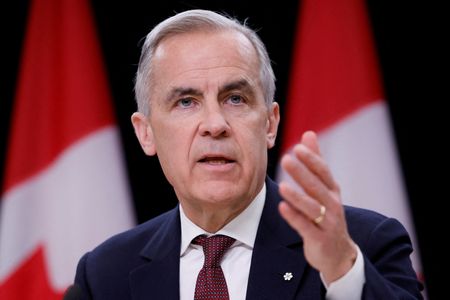By Promit Mukherjee
OTTAWA (Reuters) -A manufacturer of capsules and tablets for the pharmaceuticals industry is scouting Asia for new partners. A steel component maker, with a client base in the United States stretching back 35 years, is telling customers to expect to pay higher prices. Another company, that produces mascot costumes for sporting or school events, is lowering its prices so as not to lose American customers.
President Donald Trump’s tariff war – and his repeated threats to annex Canada – are upending decades of close trade ties between the two North American neighbors, and prompting many small-scale Canadian manufacturing firms to revise their long-term business strategies.
Prime Minister Mark Carney, who led the Liberal party to victory last month by campaigning to stand up to Trump, is scheduled to meet the U.S. President at the White House on Tuesday. He has repeatedly said the old relationship with the United States is over.
Even if the U.S. forges a new trade agreement with Canada, Trump’s erratic policy and the uncertainty of doing business with the U.S. will persist, according to interviews with more than a dozen companies, advisors, trade lawyers and associations.
“If you are a smart, savvy business person, you are not going to jump right back into another arrangement where you are totally reliant on a U.S. partner,” said Mike Chisholm, who runs a consultancy for Canadian exporters.
“Owners want stability, banks want stability, private equity funds want stability,” he said. “They are just going to be very, very careful.”
Canada, which has historically depended on U.S. markets for 75% of its exports, was one of the first countries hit by Trump’s tariffs.
Trump has justified the tariffs as a way to hold Canada accountable for fentanyl entering the U.S. – although data shows less than 1% of all seizures come from across the Canadian border.
In March, Trump imposed a 25% tariff on all steel and aluminum imports coming into the U.S. and then slapped another 25% tariff on cars and parts that did not comply with a North American free trade agreement, although he stopped short of a broad reciprocal tariff imposed on some countries in early April.
Experts have said that adding reciprocal tariffs on Canada would have spiked bankruptcies in the manufacturing sector.
The manufacturing sector ships 42% of its output into the U.S and 41% of its roughly 1.7 million workers rely on U.S. imports, according to government figures.
Carney’s office declined to provide fresh comment on the impact of tariffs.
When asked for comment, White House spokesman Kush Desai said: “Canadian companies won’t have to worry at all about tariffs when Canada becomes our cherished 51st state.”
‘WE NEED TO PIVOT’
PNP Pharmaceuticals, a contract manufacturer for drug makers in British Columbia, responded to Trump’s tariff moves by trying to find customers in Asia, Alan Urmeneta, Partnership Sourcing Manager, said in an interview.
“We are now venturing into other markets as we see that we need to pivot,” Urmeneta said. He declined to identify specific countries.
While it does not currently face tariffs, LabelPak Printing Inc., a British Columbia-based distributor of packaging products sourced from Asia, is considering focusing exclusively on the Canadian market and gradually reducing the 15% in sales that come from the U.S.
“If he (Trump) gets mad … and decides to throw a 50% tariff on Canadian goods… it’s going to really put us out of the market,” Ken Gallie, the company’s founder, said. “We are going to put more emphasis on the Canadian business.”
While some Canadian companies have lost trust, those reliant on the U.S. market cannot entirely replace it, especially smaller firms, companies and industry associations have said.
Canada’s economy is less than a tenth the size of its neighbor and shipping overseas is costly.
Chisholm, the consultant, says some of the companies he advises are setting up offices and hiring sales agents in Europe and Asia to try to reduce their operations in the U.S.
“There are markets all over the world that we have free-trade agreements with. Where can I do business is what many are thinking,” he said.
DIFFICULT CONVERSATIONS
Other companies are having difficult conversations with U.S. customers, several executives told Reuters.
“We are talking to these businesses and telling them, unfortunately, their government has chosen to have them pay more,” James White, CEO of Wellmaster, which makes steel components used in the energy and water supply sectors.
Joyce Banda, CEO of Ontario-based Concept Factory Inc., which creates mascot costumes for sporting or school events, said she dropped her prices in anticipation of tariffs to try to keep U.S. customers. Now she is going to have to bear that loss even after Trump held off on imposing reciprocal tariffs, she said.
For Natalie Gaudreault, owner of Fusion TG, a tool steel distributor, Trump’s tariffs piled up as a double whammy on her Montreal-based business.
Her company imports almost 70% of all its steel requirement from China, molds it to customers’ specifications and supplies it to tool and die makers and roll formers. A fifth of her sales are to the U.S.
She was first hit by 25% tariffs that Canada imposed on China in October. Then came Trump’s 25% tariff. With other taxes, she estimates her products going into the U.S. will more than double in cost.
“I am not going to absorb the cost. I have to charge it to them,” she said, adding that her sales shrunk by a third in the first quarter.
Meanwhile, some firms are taking the rare step of trying to re-open contracts with clients, including clauses on sharing tariff costs, complicating business relations, said Clifford Sosnow, partner and chair of the international trade and investment group at law firm Fasken.
“It’s a hot knife through butter,” he said of such negotiations. “It doesn’t work without creating damage.”
(Reporting by Promit Mukherjee; Editing by Caroline Stauffer and Suzanne Goldenberg)











